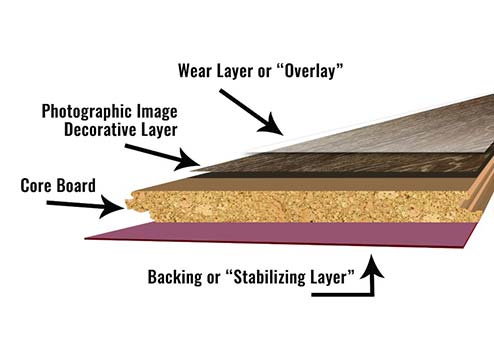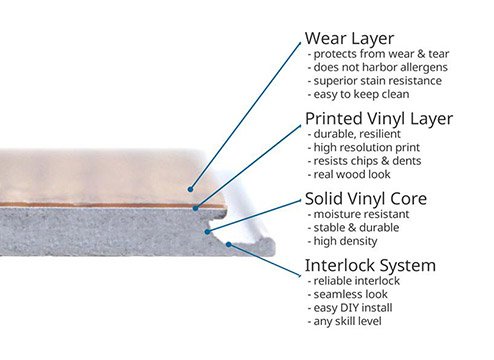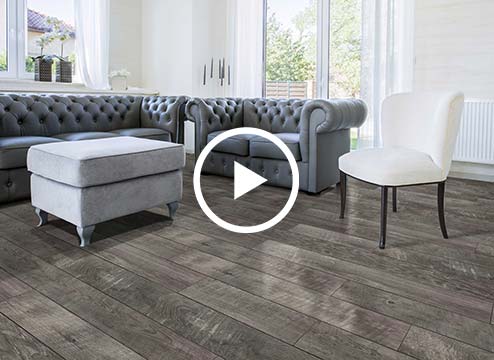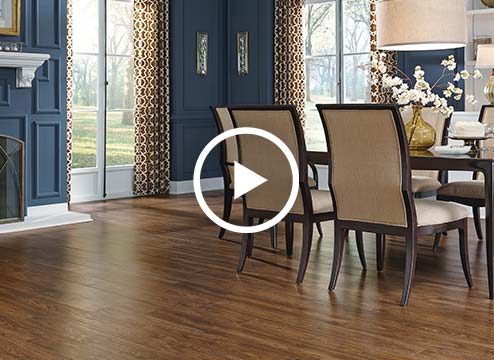Laminate vs. Vinyl Flooring: What’s the Difference?
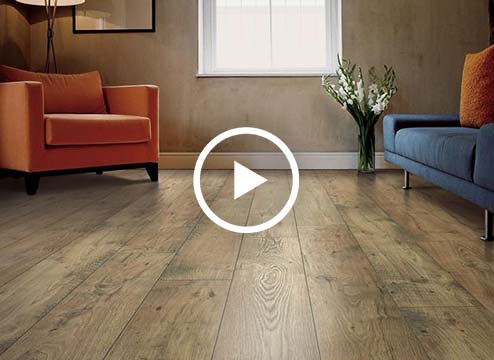
Searching for new wood-look flooring, but not sure whether to choose laminate or vinyl? Both options offer gorgeous wood looks. So how do you choose?
In this detailed guide, you’ll get a head-to-head comparison of laminate and vinyl.
Keep reading to learn how laminate and vinyl are constructed, compare their strengths and weaknesses, and discover all the info you need to make your decision easier!
In this detailed guide, you’ll get a head-to-head comparison of laminate and vinyl.
Keep reading to learn how laminate and vinyl are constructed, compare their strengths and weaknesses, and discover all the info you need to make your decision easier!
What is Laminate Flooring?
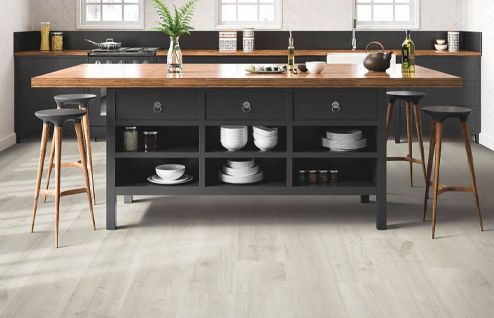
Laminate flooring is the original wood-look flooring, first hitting the market in the 1970s. Made from fiberboard and a detailed image layer, it’s known for its highly realistic wood visuals.
Laminate offers authentic wood looks that could easily pass for real hardwood. People also love how affordable laminate is.
This flooring is also known for its durability! Many laminate options are scratch-resistant and stain-resistant, making this the perfect flooring for busy homes with kids and pets.
Laminate offers authentic wood looks that could easily pass for real hardwood. People also love how affordable laminate is.
This flooring is also known for its durability! Many laminate options are scratch-resistant and stain-resistant, making this the perfect flooring for busy homes with kids and pets.
Layers of Laminate Flooring
Laminate flooring is typically made of four layers, but this can vary between manufacturers.
- Wear layer: This is the surface layer, which protects your laminate floor from wear and tear. Some wear layers also resist scratches and staining.
- Print layer: Here’s where you find those stunning wood-look visuals. This layer includes details like scrapes and knots to perfectly mimic real wood.
- Core layer: The core is made from high-density fiberboard (HDF). It’s a mixture of wood fibers and resin, which makes the plank water-resistant, or even waterproof.
- Backing layer: This is the base of the laminate plank, and luxury products can sometimes include a pre-attached underlayment.
Pros and Cons of Laminate Flooring
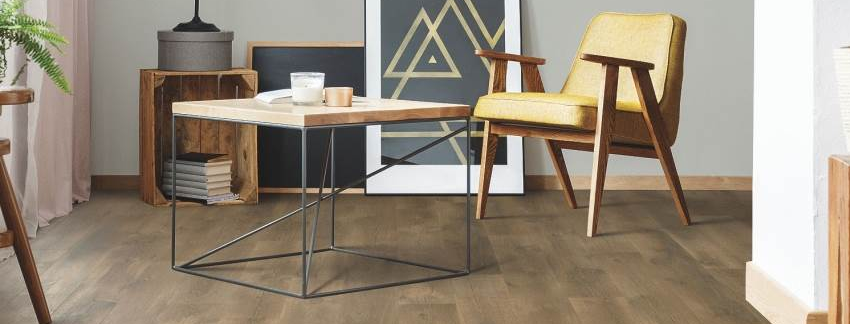
To make an informed decision, it’s important to know all the advantages of laminate and some potential downsides to keep in mind.
Pros of Laminate Flooring
- Durable: Laminate flooring’s supreme durability makes it a good option for high-traffic areas or homes with kids and pets.
- Scratch resistance: Most laminate has a strong wear layer that protects the floor from scratches, wear, and staining.
- Realistic wood looks: Laminate flooring often features detailed textures to mimic natural hardwood floors. You can find everything from popular hand-scraped looks to distressed hardwood textures.
- Waterproof options: Manufacturers have improved laminate’s water-resistant capabilities. You can now purchase 100% waterproof laminate, and install it in basements and bathrooms without worry.
- Easy to clean and maintain: Simply sweep up messes as needed. No floor waxing is ever necessary.
- Easy to install: Laminate flooring features interlocking edges, so you can snap the planks together in a breeze. You can install it as a floating floor, meaning you don’t have to deal with nails or glue. It simply “floats” over the subfloor.
- Cost-effective: Laminate floors are an affordable alternative to hardwood.
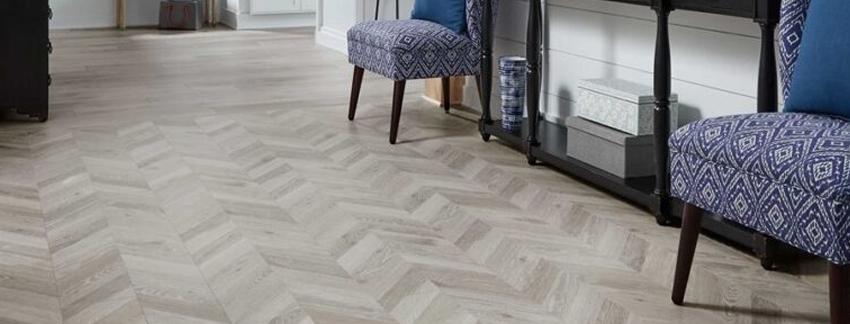
Cons of Laminate Flooring
- Moisture: While laminate flooring has come a long way in its waterproof capabilities, not all laminate is waterproof. We recommended a vapor barrier underneath the floor to help prevent moisture issues.
- Can’t refinish: Laminate is synthetic, and the surface layer can’t be sanded down and refinished. If you want to change the look of the floor, or if it’s starting to look worn, you’ll have to replace it.
What is Vinyl Flooring?
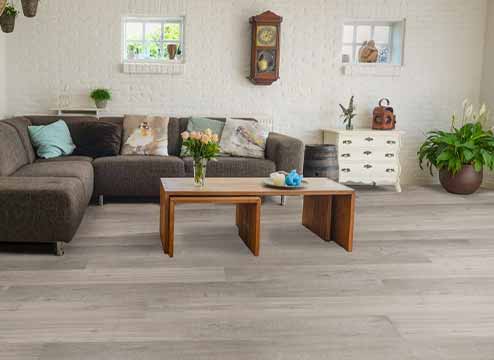
Vinyl flooring is also synthetic, with looks resembling natural materials such as wood and stone. For the past decade, vinyl has taken over the market with luxury vinyl plank flooring that is durable, stylish, and waterproof.
Unlike laminate, vinyl flooring is one of the largest flooring categories with lots of different options, including vinyl planks, sheet vinyl, and vinyl tile flooring.
People most often confuse vinyl planks with laminate, we’ll help you identify the differences between the two.
Unlike laminate, vinyl flooring is one of the largest flooring categories with lots of different options, including vinyl planks, sheet vinyl, and vinyl tile flooring.
People most often confuse vinyl planks with laminate, we’ll help you identify the differences between the two.
Layers of Vinyl Flooring
Vinyl is also typically made of four layers, though this can vary between manufacturers.
- Wear layer: Just like with laminate, the wear layer is designed for protection. Typically, the thicker the wear layer, the more wear and tear it can handle.
- Print layer: This is where you get the gorgeous printed imagery that makes vinyl look nearly identical to natural materials like stone and wood.
- Core layer: For vinyl flooring, this core layer can be made of several materials. Sometimes it’s just solid vinyl, but more luxury waterproof vinyl will have a stone-plastic composite (SPC) or wood-plastic composite (WPC) core.
- Backing layer: The sturdy base of your plank, which will often include an attached underlayment.
Pros and Cons of Vinyl Flooring
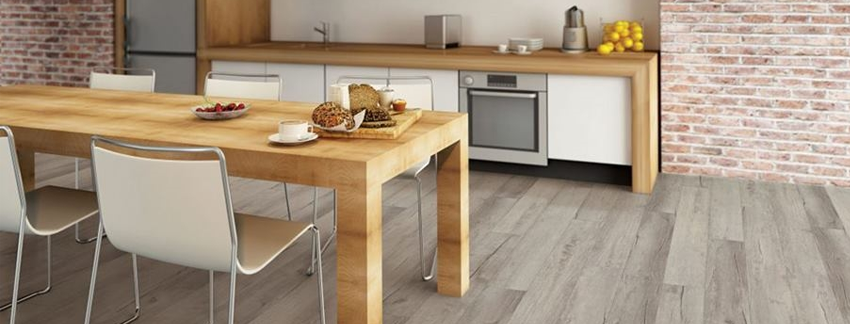
To get an even better idea if this is the right flooring for you, check out these vinyl flooring pros and cons.
Pros of Vinyl Flooring
- Realistic wood and stone looks: High-end vinyl floors can mimic natural materials better than ever before.
- DIY installation: Most vinyl planks offer an easy interlocking design so you can “float” the planks over the subfloor with nails or glue.
- Easy to maintain: Vinyl flooring is super easy to take care of. Most options are water-resistant and many are fully waterproof. Just make sure you choose a thick wear layer to prevent wear and tear.
- Resilient: If you want vinyl flooring that is resilient and comfortable underfoot, choose WPC vinyl.
- Waterproof options: WPC and SPC vinyl is 100% waterproof. You can install it anywhere with high moisture — basements, bathrooms, you name it.
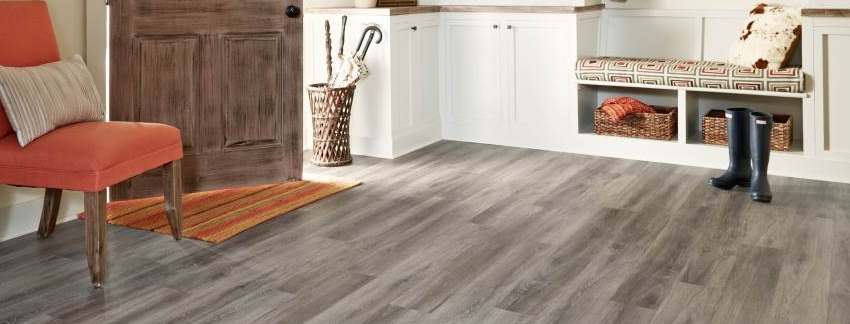
Cons of Vinyl Flooring
- Doesn’t feel like real wood: To the touch, vinyl feels pretty different from solid hardwood. This is important to some homeowners.
- Price: As you move onto waterproof and luxury options, this can run you more than other wood-look options like laminate. But they come with a whole lot more bells and whistles!
- Low-quality planks scratch and dent easily: If you want a vinyl plank that can stand up to high traffic, family, and pets, you’ve got to go with a high-quality plank, which can cost more.
Laminate vs. Vinyl Flooring: Which is Better?
Now it’s time for the laminate vs. vinyl flooring showdown. Here’s the head-to-head comparison of essential factors such as cost, installation, and durability.
Cost
There is a wide range of both laminate and vinyl flooring products. Vinyl typically has a wider price range of products. For top-end luxury vinyl, you may pay a little more than for high-end laminate.
Make sure to discuss installation costs with your installer. One option may cost more for the installation and that could alter which flooring is less expensive in the long run.
Make sure to discuss installation costs with your installer. One option may cost more for the installation and that could alter which flooring is less expensive in the long run.
Look and Feel
As far as looks go, you can find ultra-realistic wood looks in both types. The feel is a different story. Laminate, when installed poorly, can also create a hollow, empty sound underfoot which can be a deal-breaker for many homeowners.
Installation
Most laminate is installed as a “floating floor” which means you don’t need any glue or nails. Just lay it right on top of your existing floor, and you’re done.
Vinyl, on the other hand, has several installation types including peel and stick, glue down, and loose lay, at varying difficulties. If you are gluing down, it will be more challenging than laminate.
Use
Laminate has a reputation for not handling moisture well. Waterproof laminate floors are better for areas like basements and bathrooms, but waterproof vinyl is still more common, and more advanced.
Durability
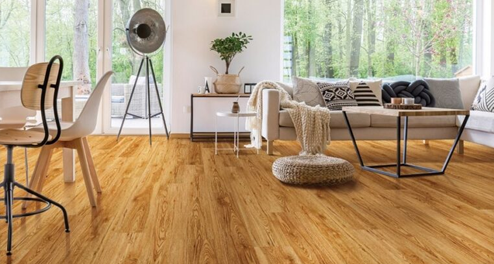
High-quality laminate and vinyl are both very durable floors with long shelf lives. They have strong wear layers and can handle pets, kids, and heavy traffic.
For a long time, laminate flooring was considered more durable, but vinyl has been catching up. While laminate offers a strong protective wear layer, vinyl is much better at resisting dents and heavy drops, and vinyl wear layers keep getting better and better.
For a long time, laminate flooring was considered more durable, but vinyl has been catching up. While laminate offers a strong protective wear layer, vinyl is much better at resisting dents and heavy drops, and vinyl wear layers keep getting better and better.
Sustainability
Vinyl and laminate are equally eco-friendly, so you don’t need to feel guilty about choosing one over the other! Some products are even FloorScore® certified for indoor air quality, and some are made in the USA!
Conclusion
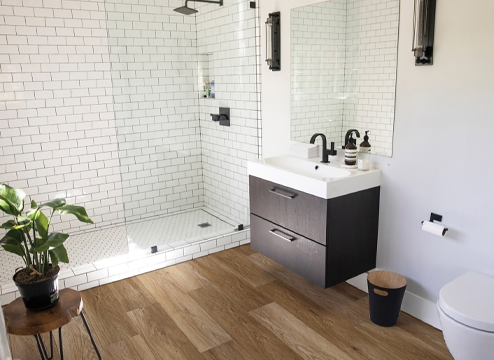
In the end, the best choice depends on your needs. Both are strong, beautiful floors that are less expensive than natural wood.
Determine what’s most important to you when comparing laminate vs. vinyl flooring. The best part is, you can order free samples of both laminate and vinyl and compare and contrast for yourself!
Determine what’s most important to you when comparing laminate vs. vinyl flooring. The best part is, you can order free samples of both laminate and vinyl and compare and contrast for yourself!


